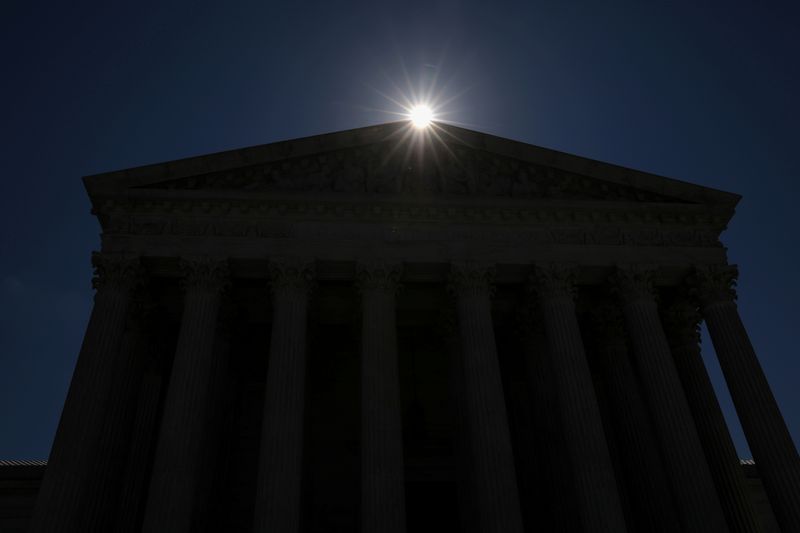By Lawrence Hurley
WASHINGTON (Reuters) - The U.S. Supreme Court has cemented its reputation as a friend to Christian conservatives with a trio of rulings embracing religious exemptions to certain federal laws and paving the way for public money to go to religious schools.
Religious conservatives welcomed the rulings with delight after expressing disappointment last month after the court found that federal civil rights law protects gay and transgender workers from employment discrimination and invalidated a restrictive Louisiana abortion law.
"When religious freedom is allowed to flourish, everyone wins," said John Bursch, a lawyer with the conservative Christian legal group Alliance Defending Freedom.
The court, which has a 5-4 conservative majority, in recent years has embraced an expansive view of religious liberties in cases involving government funds going to religious entities and permitting religious symbols on public land. The three recent rulings build on that.
In one of Wednesday's rulings, the court allowed employers to receive wide religious and moral exemptions to a federal mandate that health insurance they provide to workers includes coverage of women's birth control. The 7-2 ruling upheld a 2018 rule crafted by President Donald Trump's administration to weaken the mandate contained in the Obamacare healthcare law.
In another 7-2 ruling on Wednesday in a case from California, the justices shielded religious schools from employment discrimination lawsuits.
Carrie Severino, a conservative legal activist who advocates in support of Trump's judicial nominees and had been critical of the court's LGBT ruling, wrote on Twitter, "Great day for religious liberty at the Court today."
A third case last week, in a 5-4 ruling endorsing Montana tax credits that helped pay for students to attend religious schools, paved the way for more public funding of faith-based institutions.
"To me, the takeaway is that they are headed in good directions on religious liberty," said Mark Rienzi, president of Becket, a religious liberty legal group involved in both cases decided on Wednesday.
Rienzi noted that the pair of 7-2 rulings, with two of the court's four liberals in each case joining the conservative justices, indicated some consensus on religious liberty cases.
Christian conservatives are an important source of political support for Trump, who is seeking re-election on Nov. 3.
'RIGHT TO DISCRIMINATE'
For those opposed to an expansive view of religious rights, the recent rulings dovetail in ominous ways.
"It is distressing that taxpayer money will be directed to religious schools that have the absolute right to discriminate against their schoolteachers," University of Miami School of Law professor Caroline Mala Corbin said.
Wednesday's rulings bolstered religious entities seeking exemptions from federal laws.
In the contraception case, religious groups including the Little Sisters of the Poor, a Roman Catholic order of nuns, wanted a complete exemption from the Obamacare requirement that they include contraception coverage in their employee health insurance plans. In the California case, two Catholic elementary schools won protection from employment lawsuits brought by former teachers accusing them of discrimination based on age and disability.
The Montana schools ruling was a boost to conservative Christian activists - including Trump's education secretary Betsy DeVos - who have long sought the expansion of "school choice" programs that allow public funds to pay for students to attend religious schools rather than secular public schools.
For LGBT activists celebrating the June 15 ruling recognizing workplace discrimination protections, there is concern that courts increasingly may allow religious beliefs to be cited by individuals, businesses and religious groups to evade state and local anti-discrimination laws.
A crucial case is looming on that very subject. The court has agreed to hear in its next term, which starts in October, a dispute over whether Philadelphia violated the U.S. Constitution's First Amendment rights of freedom of speech and religion in how it dealt with an organization that is part of the city's Roman Catholic archdiocese.
City officials barred Catholic Social Services from participating in Philadelphia's foster-care program because the organization prohibited same-sex couples from serving as foster parents, a violation of local anti-discrimination policies.
American Civil Liberties Union lawyer James Esseks said the California schools ruling on Wednesday would make it easier for religious employers to discriminate against LGBT workers even though the court embraced workplace discrimination protections for them.

"The court," Esseks added, "must not expand a license to discriminate any further than it has today."